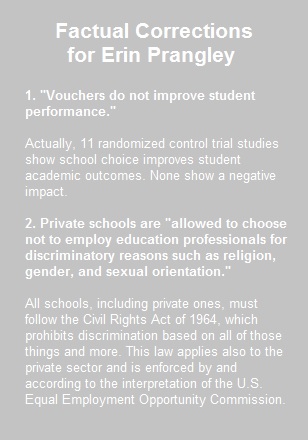Public Schools Provide Quality Education, Except When They Don’t
In “Voucher Schools Provide Choice, Except When They Don’t,” the author Erin Prangley’s diatribe against school choice exposes the self-serving, “it’s good for me, but not for you” attitude that underlies the American Association of University Women’s (AAUW) position against vouchers.
Ms. Prangley begins by affirming AAUW’s position supporting “quality public education for all.” It sounds righteous enough, except that its definition of “all” excludes its staff’s own children, who, presumably, have parents rich enough to afford private schools without a voucher. Whereas Ms. Prangley asserts she is smart enough to send her own children to a wonderful private school, she evidently assumes that you and I can’t find private schools that meet her standards. And in that case, everyone who wants a quality education should be denied a voucher.
The Breakdown

- Ms. Prangley complains that private schools have admission policies that admit some, but deny others. Yet colleges, which accept public funding, also have stringent entrance requirements designed to ensure students will be successful at their school, while others have open admissions policies. In either case, higher-ed schools, like private K-12 schools, are schools of choice. No one forces enrollment.
- Children are disciplined in private schools, sometimes leading to expulsion and suspension, but Ms. Prangley suggests this is discriminatory and particular to private schools. She apparently missed the Nondiscriminatory Administration of School Discipline advisory issued January 8 to public schools by Arne Duncan and Eric Holder, affirming that discipline in public schools is so discriminatory that they have decided federal intervention is required. She also neglected one critical distinction: If a private school is mistreating its students, every child, including those using a voucher, may leave that school. When public schools mistreat their students who are arbitrarily assigned to attend that school based on their ZIP Code, students have nowhere to go unless they have money or, surprise, a voucher.
- Ms. Prangley’s third point is the most revealing of all: that bad operators of private schools can steal money and run off to live in a gated community by the beach. Besides the clear envy-baiting in that complaint, her concern was for the money; nary a word about the kids who were left without a school and a poor education. Also, a lone system abuser is not reason enough to take away school choice. What about public schools that steal a child’s future, and most despicably, for the purpose of lining their own pockets, like Principal Marcella Sills has done in New York? Again, a lone example of a system abuser. If Ms. Prangley’s solution to prevent bad actors from running private schools is to prohibit children from using publicly-funded vouchers to attend private schools, then it is equally reasonable to assert that there should be no public funding of government schools for the same reason.
Can’t We All Get Along
Ms. Prangley and I agree on her final point: It’s time to “drop the charade.” As President Obama said in his State of the Union address, “when women succeed, America succeeds.” True enough, yet this will not occur until we stop erecting false barriers that divide us into our corners of self-interest. AAUW claims it is “Breaking through Barriers”; the most direct, effective way for children to break through the barriers that keep them trapped in schools that inhibit their ability to learn is to give them freedom to find a better fit. To give them a choice.




